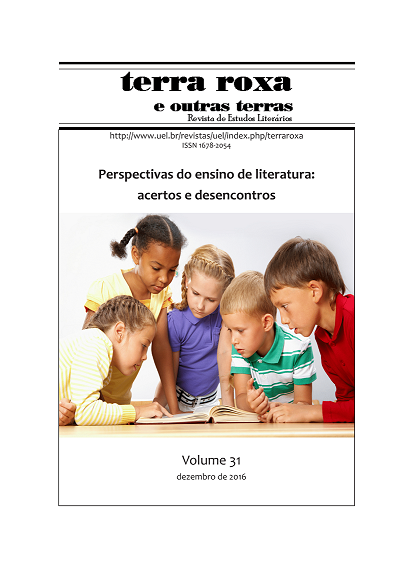Classical and contemporary works in school: how to access them, why read them?
DOI:
https://doi.org/10.5433/1678-2054.2016v31p31Keywords:
Contemporary Literature, Classical Literature, Historical-Critical PedagogyAbstract
This article proposes a discussion on the literary reading practices made in the school environment, from two moments: first, it is thought how to access literature from reading in new media and supporters, as well as literary experiments in contemporary times that They point to the rise of multimedia writer and a new reader profile. Second time, we try to think of the update of the literary classics reading procedures in school, understanding it as a right of the student to have access to aesthetic and cultural objects can fulfill an important role in a humanistic education, endorsed by a historical-critical approach. In parallel, develops a reflection on the problems and difficulties in the implementation of public policies to modify the low literary reading rate in elementary school. So we intend to contribute to think about the relevance of classical works in schools and the incorporation of new reading practices that can improve the contact of students with the literary canon and contemporary authors.Downloads
References
BRASIL; Ministério da Educação. Programa Nacional Biblioteca da Escola (PNBE): leitura e bibliotecas nas escolas públicas brasileiras / Secretaria de Educação Básica, Coordenação-Geral de Materiais Didáticos; elaboração Andréa Berenblum e Jane Paiva. Brasília: Ministério da Educação, 2008.
CALVINO, Italo. Por que ler os clássicos. Tradução de Nilson Moulin. São Paulo: Companhia das Letras, 1993.
CANDIDO, Antônio. Vários escritos. São Paulo: Ouro sobre Azul, 2004.
CHARTIER, Roger. Os desafios da escrita. Tradução de Fulvia M. L. Moretto. São Paulo: UNESP, 2002.
EAGLETON, Terry. As ilusões do pós-modernismo. Tradução de Elisabeth Barbosa. Rio de Janeiro: Jorge Zahar, 1998.
FIGUEIREDO, Vera Lúcia Follain de. Narrativas migrantes: Literatura, Roteiro e Cinema. Rio de Janeiro: Editora PUC Rio/7Letras, 2011.
GARCIA CANCLINI, Néstor. Leitores, espectadores e internautas. Tradução de Ana Goldberger. São Paulo: Iluminuras, 2008.
JAMESON, Fredric. A cultura do dinheiro: ensaios sobre a globalização. Tradução de Maria Elisa Cevasco e Marcos César de Paula Soares. Petrópolis: Vozes, 2001.
JENKINS, Henry. Cultura da convergência. Tradução de Suzana Alexandria. 2ª ed. São Paulo: Aleph, 2009.
LAJOLO, Marisa. Do mundo da leitura para a leitura do mundo. São Paulo: Ática, 1993.
LUKÁCS, Gyorgy. Introdução a uma estética marxista: sobre a categoria da particularidade. Tradução de Carlos Nelson Coutinho e Leandro Konder. 2 ed. Rio de Janeiro: Civilização Brasileira, 1978.
PAIVA, Jane, e Andréa Berenblum. "Programa Nacional Biblioteca da Escola (PNBE) - uma avaliação diagnóstica". Pro-Posições (Campinas), v. 20, n. 1 (58), p. 173-188, 2009.
PELLEGRINI, Tânia. "A literatura e o leitor em tempos de mídia e mercado". Horizontes (Itatiba), v.15, p. 325-335, 1997.
SARLO, Beatriz. Tempo Presente: notas sobre a mudança de uma cultura. Tradução de Luís Carlos Cabral. Rio de Janeiro: José Olympio, 2005.
SAVIANI, Dermeval. Pedagogia histórico-crítica: primeiras aproximações. Campinas: Autores Associados, 2005.
TODOROV, Tzvetan. Literatura em perigo. Tradução de Caio Meira. Rio de Janeiro: DIFEL, 2009.
Downloads
Published
How to Cite
Issue
Section
License
Copyright (c) 2016 Terra Roxa e Outras Terras: Revista de Estudos Literários

This work is licensed under a Creative Commons Attribution 4.0 International License.
Authors who publish in this journal agree to the following terms:
a) The authors retain the copyright and grant the journal the right of first publication, the work being simultaneously licensed under the Creative Commons Attribution-NonCommercial 4.0 International License, allowing the sharing of the work with acknowledgment of the authorship of the work and initial publication in this journal.
b) Authors are authorized to assume additional contracts separately, for non-exclusive distribution of the version of the work published in this journal (eg, publish in an institutional repository or as a book chapter), with acknowledgment of authorship and initial publication in this journal.
c) Authors are allowed and encouraged to publish and distribute their work online (e.g. in institutional repositories or on their personal page) after the editorial process, as this can generate productive changes as well as increase impact and citation of the published work (See The Effect of Open Access).
d) The authors of the approved works authorize the journal to, after publication, transfer their content for reproduction in content indexers, virtual libraries and the like.
e) The authors assume that the texts submitted for publication are of their original creation, taking full responsibility for their content in case of any objection by third parties.




















